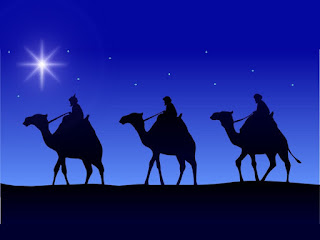Following the Light
"In the time of King Herod, after Jesus was born in Bethlehem of Judea, magi (wise men) from the East came to Jerusalem, asking, "Where is the child who has been born king of the Jews? For we have observed his star at its rising, and have come to pay him homage. " When King Herod heard this, he was frightened, and all Jerusalem with him . . ." --Matthew 2:1-3
Our pre-Christmas class focused on the story of the magi from the East, likely from what is now Iran or Iraq, following the light of a star all the way to Jerusalem, then to Bethlehem, where they encounter Jesus, who by then may be as much as two years old. "Magi" are those with "an unusual capacity for understanding."
The discussion explored the story at multiple levels:
--Stars: Do they really stop moving, or are they like a rainbow,,you never realy get to them?
In the story, the tiny light is set against the expansive darkness--they follow it on a long journey. When they get close to Israel, they apparently stop following the light, just assuming that the new "king" would be in the capital, Jerusalem. They find Herod instead. When they seek the light again, they are led to Bethlehem. The story may say something to us about following our own assumptions rather than seeking and following the light of the gospel.
The idea of a star or rainbow never stopping is a compelling one--sort of like our journeys of faith, which always continue!
--If the wise men saw the star, why didn't other people see it and wonder about it? A great question for reflection! This is a common theme in the gospels: Mary answers yes to a question most people would say no to; Jospeh listens to God in spite of his fears and the likelihood of being ridiculed; the shepherds hear the announcement of the angels when no one else does; Simeon and Anna recognize the baby Jesus as the Messiah from among all the people and familes at the Jerusalem Temple, when no one else seems aware. What things prepare some of us or sensitize us to the presence of God among us?
--Why did Herod want to kill all the babies and why was Jesus so threatening to him and all of Jerusalem (as stated in scripture)?
Herod felt threatened by another form of power that he couldn't control. The story is a powerful example of how awful human behavior can become when power and control and the familiar are threatened. And of course, none of us can "control God!" So when God sends us new life, or makes changes (even wonderful changes) in our lives, it is destabilizing. In the case of the awful Bethlehem story, Herod figured out that Jesus must be around two years old, so he decded to get rid of all the male babies two and under. As members of the class recognized, this sounds a great deal like the Moses story in Exodus. What could a different response have been?
--It was noted that the wise men were outsiders (another sign that God's love is for all people and not jsut for "insiders.") The "people of faith" were not paying attention to what God was doing as much as the people from another place and faith. (Class members saw parallels of this in world events)
--The gifts that the wise men brought the Child were strange. Was the gift of myrrh a foreshadowing of his death?
--The dreams and angel of the Lord reminded us of other parts of the birth narrative.
It is interesting that the magi start out listening to King Herod's orders but in the end they resist those orders, protecting the life of Jesus. What role does God have in such changes of behavior? And the story says "they go home by another way." Is that just about a different route on the map, or have they themselves changed, going home differently than how they came?




Comments
Post a Comment